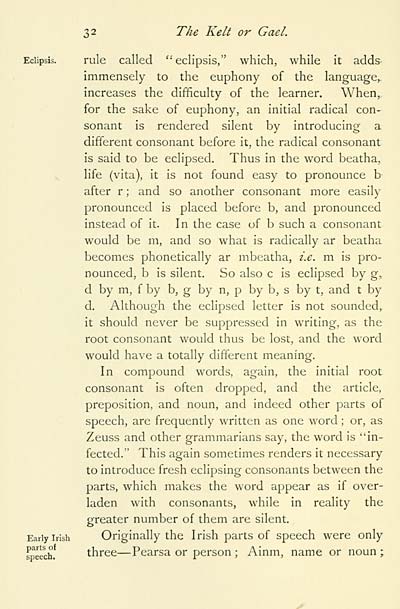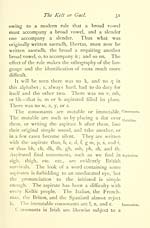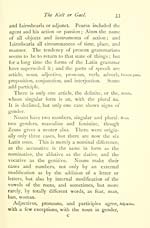Blair Collection > Kelt or Gael
(36)
Download files
Complete book:
Individual page:
Thumbnail gallery: Grid view | List view

32 The Kelt or Gael.
Eciipsis. rule called '•' eclipsis," which, while it adds
immensely to the euphony of the language,,
increases the difficulty of the learner. When,
for the sake of euphony, an initial radical con-
sonant is rendered silent by introducing a
different consonant before it, the radical consonant
is said to be eclipsed. Thus in the word beatha,
life (vita), it is not found easy to pronounce b
after r ; and so another consonant more easily
pronounced is placed before b, and pronounced
instead of it. In the case of b such a consonant
would be m, and so what is radically ar beatha
becomes phonetically ar mbeatha, i.e. m is pro-
nounced, b is silent. So also c is eclipsed by g,
d by m, f by b, g by n, p by b, s by t, and t by
d. Although the eclipsed letter is not sounded,
it should never be suppressed in writing, as the
root consonant would thus be lost, and the word
would have a totally different meaning.
In compound words, again, the initial root
consonant is often dropped, and the article,
preposition, and noun, and indeed other parts of
speech, are frequently written as one word ; or, as
Zeuss and other grammarians say, the word is "in-
fected." This again sometimes renders it necessary
to introduce fresh eclipsing consonants between the
parts, which makes the word appear as if over-
laden with consonants, while in reality the
greater number of them are silent.
Early Irish Originally the Irish parts of speech were only
speech! three — Pearsa or person ; Ainm, name or noun ;
Eciipsis. rule called '•' eclipsis," which, while it adds
immensely to the euphony of the language,,
increases the difficulty of the learner. When,
for the sake of euphony, an initial radical con-
sonant is rendered silent by introducing a
different consonant before it, the radical consonant
is said to be eclipsed. Thus in the word beatha,
life (vita), it is not found easy to pronounce b
after r ; and so another consonant more easily
pronounced is placed before b, and pronounced
instead of it. In the case of b such a consonant
would be m, and so what is radically ar beatha
becomes phonetically ar mbeatha, i.e. m is pro-
nounced, b is silent. So also c is eclipsed by g,
d by m, f by b, g by n, p by b, s by t, and t by
d. Although the eclipsed letter is not sounded,
it should never be suppressed in writing, as the
root consonant would thus be lost, and the word
would have a totally different meaning.
In compound words, again, the initial root
consonant is often dropped, and the article,
preposition, and noun, and indeed other parts of
speech, are frequently written as one word ; or, as
Zeuss and other grammarians say, the word is "in-
fected." This again sometimes renders it necessary
to introduce fresh eclipsing consonants between the
parts, which makes the word appear as if over-
laden with consonants, while in reality the
greater number of them are silent.
Early Irish Originally the Irish parts of speech were only
speech! three — Pearsa or person ; Ainm, name or noun ;
Set display mode to: Large image | Transcription
Images and transcriptions on this page, including medium image downloads, may be used under the Creative Commons Attribution 4.0 International Licence unless otherwise stated. ![]()
| Early Gaelic Book Collections > Blair Collection > Kelt or Gael > (36) |
|---|
| Permanent URL | https://digital.nls.uk/75787080 |
|---|
| Description | His ethnography, geography and philology. |
|---|---|
| Shelfmark | Blair.17 |
| Additional NLS resources: | |
| Attribution and copyright: |
|
| Description | A selection of books from a collection of more than 500 titles, mostly on religious and literary topics. Also includes some material dealing with other Celtic languages and societies. Collection created towards the end of the 19th century by Lady Evelyn Stewart Murray. |
|---|
| Description | Selected items from five 'Special and Named Printed Collections'. Includes books in Gaelic and other Celtic languages, works about the Gaels, their languages, literature, culture and history. |
|---|

